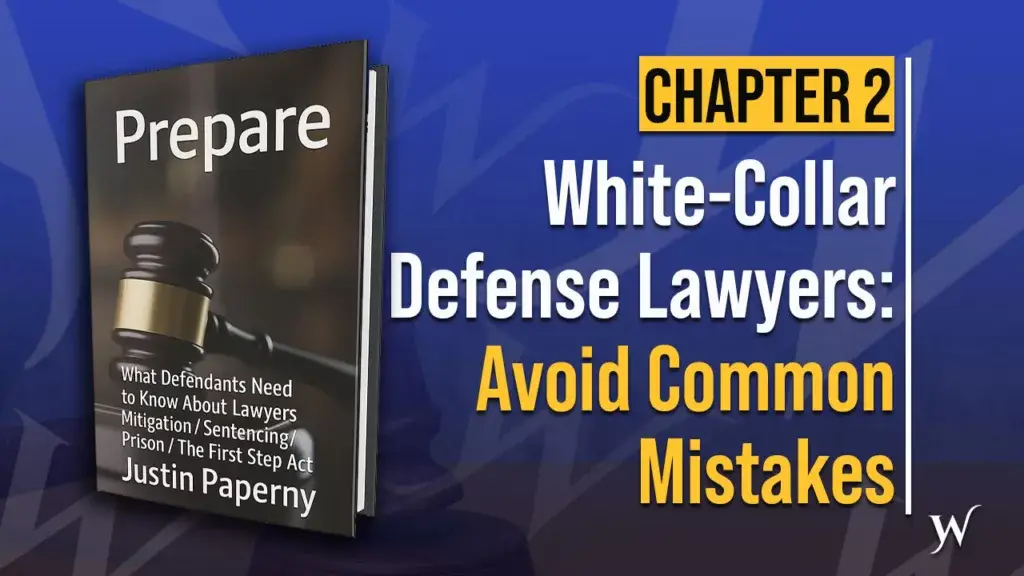Table of Contents
White Collar Crime Investigations Escalate
White collar crime investigations escalate quickly because people don’t understand how their actions are interpreted by investigators, prosecutors, probation officers, and judges. This chapter explains why early knowledge matters, how the criminal justice system actually works, and why preparation influences everything from charging decisions to sentencing. It breaks down how investigations begin, how stakeholders view a defendant, and why even educated professionals make avoidable mistakes that increase their exposure.
Why These Investigations Catch People Off Guard
I’m Justin Paperny, Co-Founder of White Collar Advice. Michael Santos and I created this book years ago because people going through white collar crime investigations rarely get reliable information early enough. This book isn’t about me — it’s about helping you avoid mistakes that thousands of people make when they don’t understand the process. Let’s get into Chapter 1.
The short answer to “What do I need to know?” is: more than you think.
People under scrutiny from law enforcement often make decisions that worsen their situation. Not because they’re reckless — but because they don’t know what’s actually happening, what options exist, or how investigators interpret their behavior. Without context, a person can talk their way into an indictment, lose opportunities for diversion, or increase their exposure.
Why Knowledge Early Makes a Difference
A skilled criminal defense lawyer is essential. But even the best lawyer can’t compensate for a client who doesn’t understand the basics. People who have never dealt with criminal law usually feel like they’re navigating with the lights off. Every email, meeting, or phone call feels risky because they don’t know how it may be viewed.
The more someone understands how the system works, the more helpful they become to their lawyer. They communicate more clearly. They gather documents more effectively. They avoid self-inflicted wounds. And they make decisions with a clearer view of the consequences.
Learning during an investigation isn’t optional — it’s protective. When you understand the sequence of events, what investigators want, and how prosecutors think, you stop reacting blindly. You start making deliberate choices that influence outcomes.
What’s Really at Stake in White Collar Crime Investigations
When someone gets pulled into a government investigation, the costs add up quickly. Legal fees are only the beginning. Liberty is at risk. Earning power is at risk. And the collateral consequences — banking limitations, career loss, licensing problems, reputational damage — can follow a person for years.
People often underestimate this part. They assume the worst outcome is “a tough conversation” or “a misunderstanding that eventually clears.” But the justice system rarely works that way.
Preparing early isn’t about fear. It’s about protecting your future.
How Stakeholders Actually See a Defendant In White Collar Crime Investigations
Family, friends, and colleagues usually see the full person — past contributions, career history, community involvement. But inside the criminal justice system, everything narrows fast. Prosecutors focus on conduct. Investigators focus on statements and documents. Probation focuses on history, remorse, and accountability. Judges focus on credibility.
Once you’re labeled a “defendant,” the full picture of your life disappears unless you build a record that shows it. A single charge can overshadow decades of good decisions.
Most people entering the system want one of three things:
- No prosecution
- A non-custodial resolution
- The lowest possible sentence
All three depend on preparation, accuracy, and timing — not hope.
Yogi Berra said, “If you don’t know where you’re going, you’ll end up someplace else.” That line fits here. People who do nothing tend to end up at outcomes they never expected and never prepared for.
Understanding the Criminal Justice System You’re Entering
Most Americans only know the surface level of criminal justice: arrests, charges, courtrooms, prison. But beneath that surface are dozens of institutions, agencies, procedures, and decision points.
The U.S. actually has 53 criminal justice systems — one for every state, the federal government, the District of Columbia, and the military. Each has its own courts and rules. On top of that, there are hundreds of trial courts handling cases daily.
For someone entering this world for the first time, it feels overwhelming. You’re stepping into a system that has existed for centuries and operates at full speed. The volume of rules, procedures, and stakeholders creates confusion for anyone who isn’t prepared.
How White-Collar Investigations Work Behind the Scenes
White-collar investigations rarely begin with someone being arrested. They usually start quietly:
- financial records
- email reviews
- interviews
- whistleblower tips
- data analysis
Law enforcement agencies work together. Their objective is to determine whether a crime occurred, identify who’s responsible, and present a case prosecutors can charge. They pursue the evidence aggressively, just as some people aggressively avoid scrutiny.
Legislators create laws. Prosecutors enforce them. And the system moves forward with its own momentum.
People entering the process often assume they can slow it down, reason with investigators, or “clear things up.” That’s not how it works. Once an investigation is underway, every move becomes evidence, context, or inference.
The Investigation as a Competitive Process
To simplify the dynamic without trivializing the stakes: you and the government are not on the same team. Investigators want evidence. Prosecutors want a conviction or a plea. Defendants want diversion, acquittal, or the least severe sanction possible.
Judges serve as referees — ensuring procedures are followed. Juries sometimes decide guilt, but most cases end in negotiated pleas. After that, the “long game” begins:
- Presentence Investigation Report (PSR)
- Sentencing
- Classification
- Prison placement
- First Step Act credits
- Supervised release
- Collateral consequences
People who prepare early influence each stage. People who wait get carried by the current.
Mick Jagger said, “You can’t always get what you want.” In the criminal justice system, that’s often true — but with preparation, you can often get something far better than the worst-case scenario.
Why You Must Work Effectively With Your Lawyer
A great lawyer can argue on your behalf, negotiate outcomes, and guide you strategically. But they can’t:
- read your mind
- reconstruct your entire history
- fix a bad statement you made early
- undo months of inactivity
- rewrite your past
You strengthen your lawyer by understanding what’s coming. If you know how prison designation works, you grasp the importance of the plea agreement. If you know how probation evaluates remorse, you prepare differently for the PSR. If you know the value of mitigation, you start building your record immediately.
If you need a new lawyer or want to compare options, schedule a call.
You can also join our weekly webinar every Tuesday at 11am PST/ 2p EST.
Thank You,
Justin Paperny is an ethics and compliance speaker and founder of White Collar Advice, a national crisis management firm that prepares individuals and companies for government investigations, sentencing, and prison. He is the author of Lessons From Prison, Ethics in Motion, and the upcoming After the Fall. His work has been featured on Dr. Phil, Netflix, CNN, CNBC, Fox News, The Washington Post, and The New York Times.
Moving Forward
Chapter 2 discusses how to work effectively with a criminal defense attorney — and what most people get wrong during that relationship.
Schedule a call with our team to learn how early preparation can improve your outcome in a federal investigation or sentencing.
P.S. Watch my video with Dr. Nate Schott. His guideline range was 63 months. He served ten. Preparation made the difference.
FAQ
What typically starts a white-collar investigation?
Most begin with data irregularities, whistleblowers, cooperating witnesses, or complaints.
Should I talk to investigators if I think I’m innocent?
No. Seemingly harmless statements often create inconsistencies that strengthen the government’s case.
How early should I hire a federal criminal lawyer?
Immediately. Early representation influences charging decisions and protects you from avoidable mistakes.
Can preparation reduce my sentence?
Yes. People who document remorse, responsibility, restitution efforts, and a clear plan often receive shorter sentences.
What mistakes increase the risk of indictment?
Guessing, explaining, minimizing, emailing colleagues, deleting files, and delaying preparation.
Is it possible to avoid prison in a white-collar case?
Yes. Diversion, deferred prosecution, and probation are possible when preparation is strong.
How does the PSR interview affect my sentence?
It influences sentencing, prison placement, programming, FSA credits, and supervised release.




